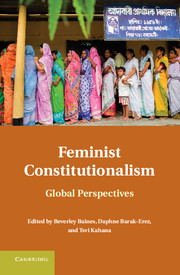Book contents
- Frontmatter
- Contents
- Foreword
- Contributors
- Introduction
- Part I Feminism as a Challenge to Constitutional Theory
- Part II Feminism and Judging
- Part III Feminism, Democracy, and Political Participation
- Part IV The Constitutionalism of Reproductive Rights
- Part V Women's Rights, Multiculturalism, and Diversity
- 17 Constitutional Rights of Women under Customary Law in Southern Africa
- 18 Minority Women
- 19 Watch GRACE Grow
- 20 Critical Multiculturalism
- 21 Democratic Theory, Feminist Theory, and Constitutionalism
- Part VI Women between Secularism and Religion
- Index
- References
20 - Critical Multiculturalism
Published online by Cambridge University Press: 05 June 2012
- Frontmatter
- Contents
- Foreword
- Contributors
- Introduction
- Part I Feminism as a Challenge to Constitutional Theory
- Part II Feminism and Judging
- Part III Feminism, Democracy, and Political Participation
- Part IV The Constitutionalism of Reproductive Rights
- Part V Women's Rights, Multiculturalism, and Diversity
- 17 Constitutional Rights of Women under Customary Law in Southern Africa
- 18 Minority Women
- 19 Watch GRACE Grow
- 20 Critical Multiculturalism
- 21 Democratic Theory, Feminist Theory, and Constitutionalism
- Part VI Women between Secularism and Religion
- Index
- References
Summary
A policy of multiculturalism is an integral part of the state's commitment to protecting group life. Yet, it also tests the limits of accommodation and interrogates the state's own ideology and its adherence to principles of equality and religious freedom. In multiculturalism policies, the status of women has been a common site of contestation and negotiation. Practices such as veiling, underage marriage, polygamy, and religious family law test the limits of tolerance. Debates around gender in the politics of difference serve simultaneously to name certain communities as backward and majority culture as the norm. A feminist critique of multiculturalism is critical to bring hidden perspectives into the dialogue between the community and the state, to highlight the gendered dimension of this issue, and to ensure that the community and state include subaltern voices in their dialogue on the accommodation of difference.
In this chapter, I discuss the idea of critical multiculturalism to better understand how pluralist democracies can formulate a policy that respects group difference while upholding gender equality. I consider these issues through the lens of Muslim women who are situated at the intersection of a religious community and secular state, making them a compelling category of analysis. Muslim women experience discrimination along multiple axes – as women, as Muslims, and as Muslim women. Their situation illustrates the paradox of multicultural vulnerability where the state's commitment to protecting minority rights can result in subordinating women's interests within the group. This raises questions of state legitimization of a differentiated citizenship through the creation of a parallel system of law that is explicitly discriminatory.
- Type
- Chapter
- Information
- Feminist ConstitutionalismGlobal Perspectives, pp. 377 - 392Publisher: Cambridge University PressPrint publication year: 2012
References
- 1
- Cited by



